Let's be honest: Who doesn't love a sizzling hot take on all things Hollywood? Especially given this, erm, eventful year of ongoing strikes and celeb divorces. And who better to deliver industry insight than the man Katie once dubbed a “king of pop culture” — Evan Ross Katz. You might remember his 2022 White Lotus finale predictions. If you can't get enough of his knife-sharp wit, be sure to subscribe to his Substack for more.
It’s been 140 days since the Writers Guild of America (WGA) went on strike on May 2, 2023, and 67 days since they were joined by SAG-AFTRA on July 14. One of the key challenges that both unions and all unions for that matter, face is keeping enough pressure on those they are striking against, which in this instance is the Alliance of Motion Picture and Television Producers (AMPTP). That is done by abstaining from work, picketing, and in a less obvious way, making the general public, many of whom are consumers of this work, aware of and ideally in conversation about the strike. After all, at the end of the day, the AMPTP is beholden to the whims of the consumer, and the more SAG-AFTRA and WGA members can corral public support, the more likely the AMPTP is to return to the bargaining table. In that sense, we, the public, have a critical role in all of this.
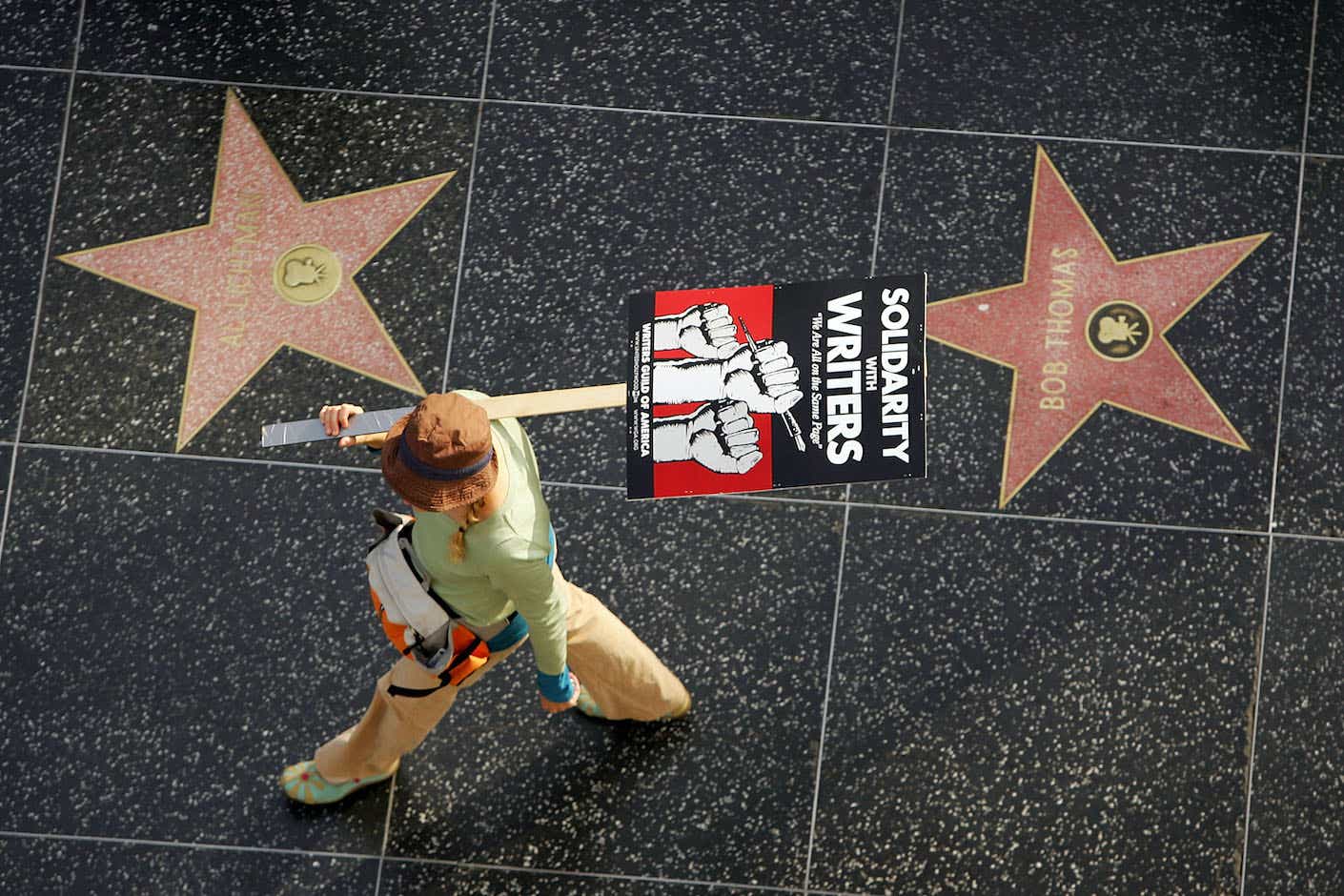
It, of course, can all be quite confusing. Take Drew Barrymore, who faced a public lashing for making the decision to resume production of her talk show, The Drew Barrymore Show. The show operates under what is referred to as the Netcode agreement, which is the SAG-AFTRA collective bargaining agreement that covers stand-in work on promos, variety shows, game shows, talk shows, soap operas, and other productions. However, such a code does not exist for the WGA, which includes the writers on her show. Therefore, although she is legally obligated to return to her show, she is also crossing the picket line. Quite a conundrum. And while it’s easy to be angry at such a decision, it’s certainly not a senseless one.
Could she refuse to return? Yes. Would CBS pursue legal action? Probably not. But would they cancel her show? They very well might. In Drew’s mind, she likely reasons that by continuing operations on her show, she is keeping hundreds of staffers employed. Many, including the show’s own writers, feel differently. “Unions only work when you stick together with unions across the labor spectrum,” the show’s co-head writer Cristina Kinon told the Daily Beast. Barrymore ultimately caved to public pressure and decided to “pause” the return of her show until the strike is over. (We’ll unpack that in Thursday’s newsletter.)
I think for many, myself included, there’s been a lot of confusion as to what the strike entails and in what way we, the public, can be of service — because we can absolutely be of service. To help answer some rudimentary and some more nuanced questions, I sought out actress and SAG-AFTRA negotiating committee member Sarah Ramos.
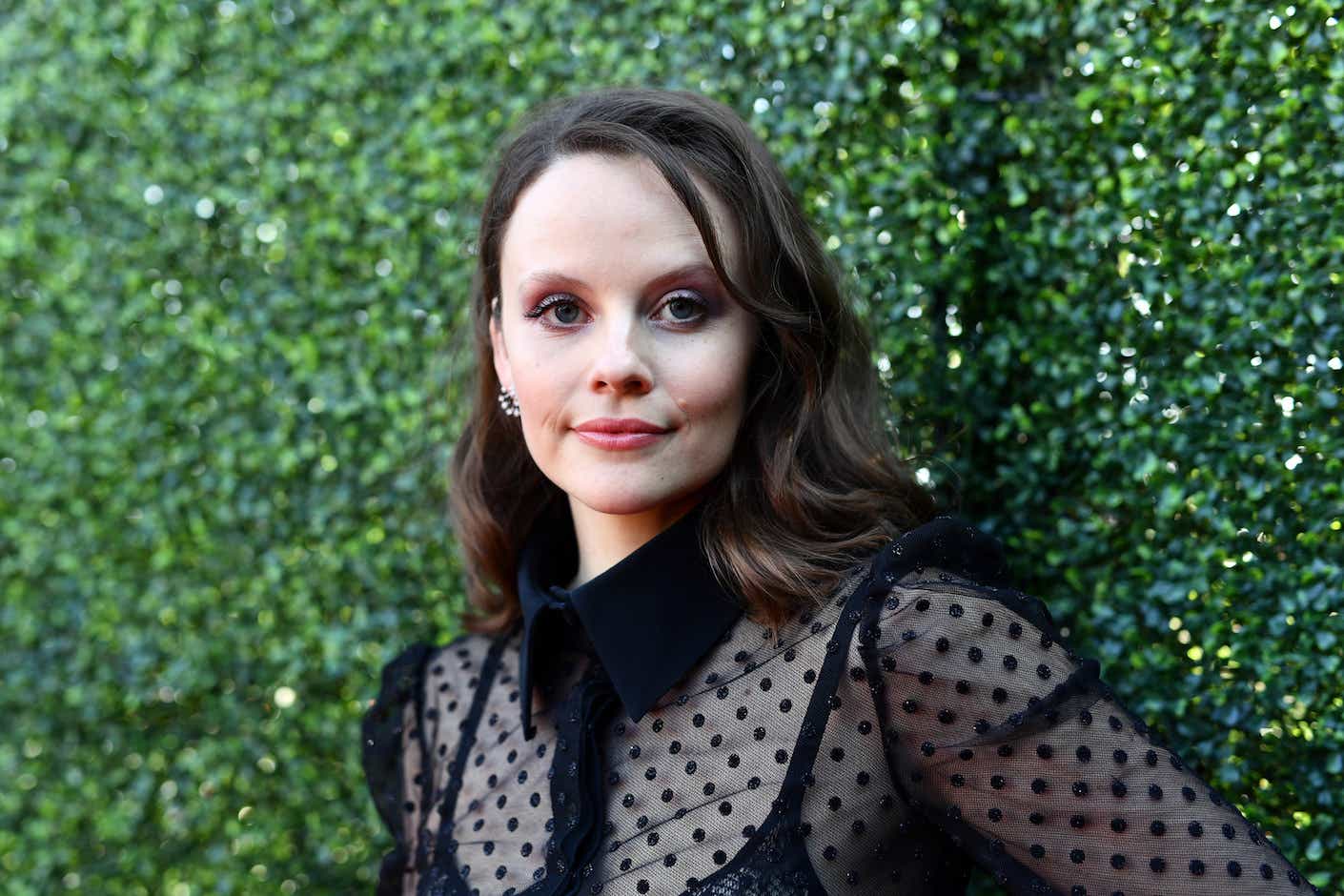
Evan Ross Katz: I think there's a lot of confusion around whether or not talk shows beyond Drew Barrymore’s are scabbing (breaking strike rules by working during the strike) by continuing to be in production. I believe this is a WGA thing and not a SAG-AFTRA thing, but I was wondering if you have any insight on this.
Sarah Ramos: There’s a ton of complexity to this double strike, and I appreciate the public navigating that and supporting us. Most talk shows are under a different SAG-AFTRA contract than the TV/theatrical/streaming contract we’re striking, which means that SAG-AFTRA members working on those shows are contractually required to show up to work during the SAG-AFTRA strike and are not breaking the SAG-AFTRA strike rules. But if the talk shows are WGA-covered, as The Drew Barrymore Show is, shooting during the WGA strike is crossing a WGA picket line and breaking the WGA strike rules. They can claim that no writing will be done, but how is that possible? Anyone doing work that would otherwise be done by a striking worker (in this case, a WGA writer) is scabbing. Also, on The Drew Barrymore Show, Drew Barrymore is more than just a SAG-AFTRA member; she’s an executive producer. She has the power and leverage to respect the picket line without concern for her career, which is why it was so disappointing when she decided to cross the picket line and such a relief that she reversed that decision.
Julia Garner recently shared the poster for her new film, The Royal Hotel, writing, “Even though SAG gave us the green light to go to these festivals and promote our film, it doesn’t feel right given the climate of the film industry right now.” That’s obviously a personal decision, but I’m wondering if there’s any feeling that those who are promoting due to exemptions are nonetheless hurting the cause.
SAG-AFTRA’s strategy for interim agreements is to allow independent producers outside of the AMPTP to make and promote their work. These are the AMPTP’s competitors, so it’s kind of like, if the AMPTP is Alexander Skarsgard in Succession, we’re making deals with all of the Roys in front of his face and letting everyone but him produce movies with SAG-AFTRA performers. Everyone is entitled to their own opinion about this strategy, and I respect and appreciate everyone from Julia Garner to Viola Davis holding an even firmer line. The other way to do it is the Jessica Chastain route of using your press to really educate people. Anything that supports the unions and pressures the AMPTP to finally come back to the table to negotiate and end these strikes is appreciated.
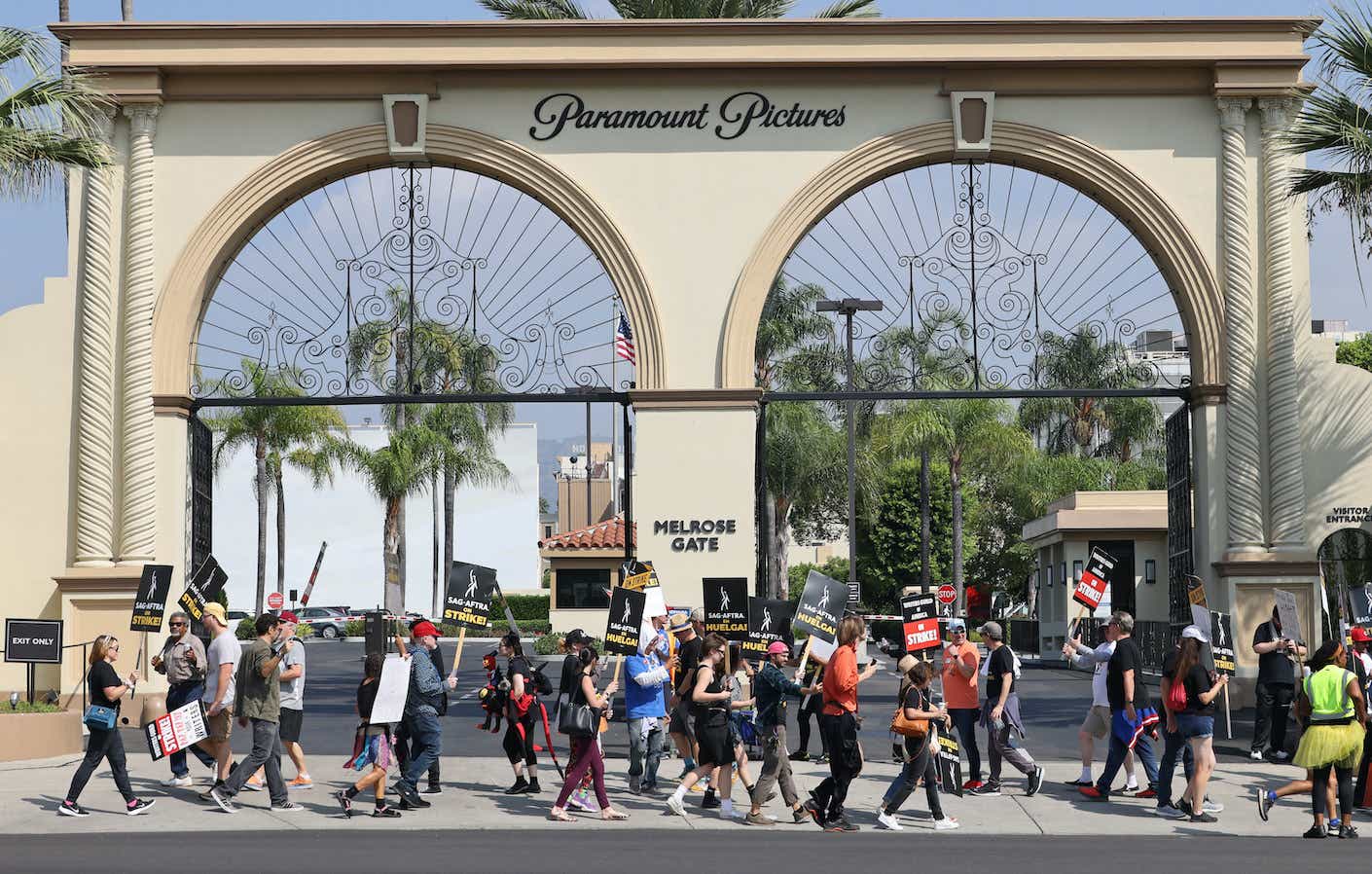
When did you first become a member of SAG-AFTRA?
Like you, I really started as a stan, and I continue to be a stan to this day.
Stans unite! (Or Stans Anonymous?)
I say my origin story with acting took place when my family paid to attend a cruise hosted by the Olsen twins called Sail with the Stars.
Let’s take a moment to process that sentence.
We went to the Caribbean, and I realized, “Wow, I can be in the same space and breathe the same air as my idols.” I also realized that I needed to actually take it a step further and follow in their footsteps and become a professional actress, and that happened when I was 10 years old. I became an actor. I quickly was cast on a show when I was 10 called American Dreams, so I joined SAG-AFTRA then. That was my initial foray into the union. I was kind of like, “Join the union? Sure! Not that I'll need it, because, by the time I'm 11, I'll be the Olsen twins and Kirsten Dunst-level famous and bada bing bada boom, I won't need your silly little protections because I'll be high-power, famous, and wealthy.” But it's 20 years later, and I'm still a working actor; that continues to be my reality. I need the union's protections, and more and more people (than you might ever realize as a fan) don't have the leverage to negotiate good deals for themselves, and the studios use the union minimums to set your rate.
How did you become a member of the negotiating committee?
I've made a career out of being a series regular on various shows — which I'm very lucky to do — but in between that time, I would spend years auditioning, as everybody does, and I always felt so horrible during those periods. And as the audition process became more self-taped and so unregulated and out of control, I just said, “You know what, enough is enough. I want to get involved in the union.” It was also partially when everybody in our country was getting involved in national politics, and I was like, “That's too much for me. I don't know how to make a difference there,” but what I do know about is the acting industry and I wanted to make a difference here. And little did I know, the union is a huge, gajillion-dollar national organization, and now, through my work on various self-tape committees, I was drafted to the negotiating committee, which is where I've been serving during the strike negotiation.
The big thing that I think a lot of people are wondering about right now is the part of the strike rules about actors promoting struck work. From the outsider's perspective, it seems that these rules punish certain actors by not allowing them to post on social media about their projects, especially in cases where the production itself was already completed prior to the strike and it's just the promotion part of the process that still needs to take place.
The principle behind banning promotion is not really aimed at these independent projects. A strike is won by causing enough damage to the other side that they are now incentivized, in a way they were not previously, to agree to our needs in this negotiation. So promotion is kind of the number-one, most immediate way to harm the studios. They've got their tentpole movies coming out, and saying, “You can't promote those right now” is an immediate consequence of them not negotiating a fair deal with us. So that's the thought process behind that. And all I have to say is: Blame the AMPTP. Anytime this happens, they should be the name. You should be blaming Disney. You should be blaming Sony. You should be blaming Amazon, Apple, Netflix — all of those companies that make up the AMPTP, and the rich CEOs at the top and their stockholders who are trying to make money are to blame for actors not being able to promote their work.
There's this perception from some outside the industry that actors are famous and therefore must be rich. From the conversations I’ve had with many actor friends of varying levels of ~success~, I know that is often not the case. I think that's one of the knowledge gaps that exist right now: the belief that this is a “rich people problem.”
I think you're actually positioned quite well to break a lot of misconceptions. I think of the New Yorker writers when they had to protest [for better pay] who said, “Prestige doesn't pay the bills.” Oftentimes, prestige pays worse than something that's not prestigious. I can speak to that from my own experience on stuff that I worked on this year. A lot of times, when a show has a lot of buzz, the producers will use that against an actor, even if it's an amazing character actor icon who the creators really want on the show. The creators only have so much power; the budgeting comes from the producers and these companies and they say, “We'll pay you the day player rate, which is around $1,000 a day, and we'll pay it for five days — or maybe just one day,” and that person might do an iconic guest star role and get paid $1,000 and the studio says, “Take it or leave it, baby.” The actor, in many cases, wants to work with the creator and is flattered and honored and is a fan of the show and wants to do their work, so these studios pit the actor against the creator of the show because who wants to risk the chance of being on the show because you're telling, say, Mike White they're not offering you a living wage? What a horrible conversation to be in. And I think that it's important to note that there's this pressure to present the front that things are going amazing and you're killing it and you're at this event and that event because you think that perception of success is going to get you hired for the next job. You might be shocked to see people on strike saying, “Look at my residuals. I can't make my mortgage” because [they seem to be so successful] because this culture of promotion has led them to act like things are better than they are.
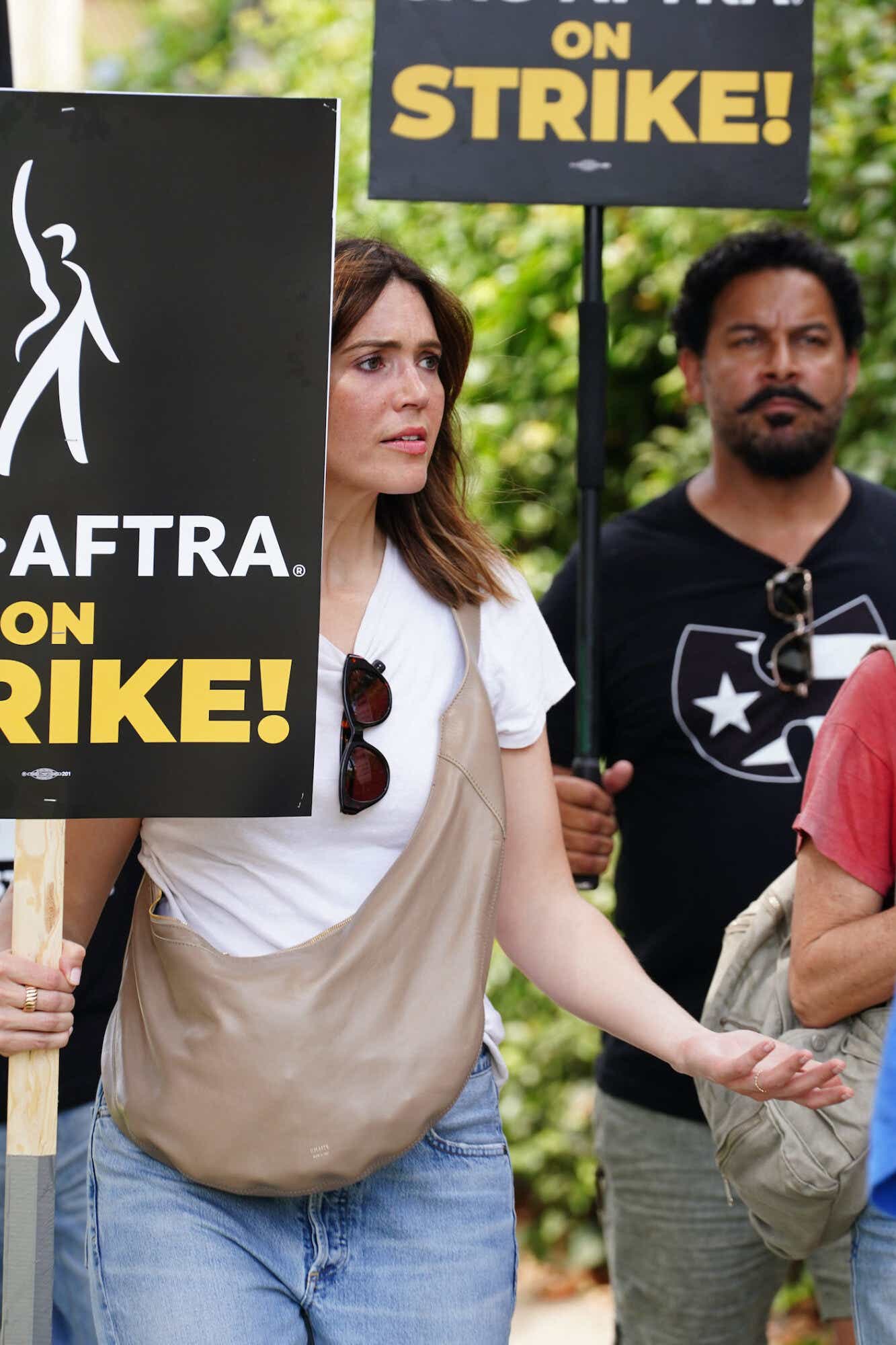
This makes me think about the recent Mandy Moore quote that went viral from her discussion of the residuals she receives from This Is Us. I was so proud of her for speaking out. Again, a lot of people who read that quote are like, “Well, she's rich! Why is she speaking out?” and it's actually so important that someone like her does speak out because it shows that even someone like Mandy Moore is making pennies, so what are those who aren’t necessarily household names making? To that point: Have there been any quotes that have emerged so far from SAG-AFTRA members, whether it be in interviews or on the picket lines, that you found particularly resonant?
Well, Fran Drescher’s speech at the press conference was a barn burner. It was incredible. You could quote that pretty much top to bottom. Dustin Milligan from Schitt's Creek also stuck out. He did a really amazing job. Something that I've seen cropping up is Bethenny Frankel saying that reality stars should have a union, and I’ve seen some nasty responses that she should “get a different job” or “get a real job”. But the truth of the matter is, the Housewives have built Bravo; they built that network, and they don't get residuals, but Bravo gets a cut of their own deals that they make. That’s worker exploitation and that's outrageous. Similarly, because image is everything in these industries, a lot of stylists have been saying, “We need a fucking union. We cannot afford to do our work,” and that seems like something that people wouldn't take seriously, but look at the Barbie press tour; it was the only thing sustaining us during this difficult time, and the stylists are working around the clock and they're saying that Netflix is only giving them $500 to do an entire look when each look might take a week, so I'm glad other people are inspired by unionists speaking out.
I want to ask you about one of the most high-profile headlines to have emerged from all of this: the mention of Tom Cruise in the Hollywood Reporter story. The piece posits that Tom reached out to SAG-AFTRA and asked what he could do to help, and SAG-AFTRA very shrewdly, might I say, replied, “Well, we'd love to see you on the picket line,” to which Tom declined. Is there anything that you can illuminate about that? Why is it important for someone like Tom Cruise to be out on the picket line?
Tom, I would still love to see you out on the picket line. Come join us. Stand with your peers. I think the important part about that is to remind the world and our union that Tom Cruise is our peer. You cannot make a movie with just movie stars. It's not possible. Unless they're stuck alone in a room for the whole movie, you can't make Mission Impossible with only movie stars. You need working actors, you need background actors, you need day players, you need journeyman actors. And Tom Cruise knows that. Otherwise, he probably would just be making a movie right now, because he would be like, “I can do this without the union.” But you cannot do it without the union. We are all peers. We're all in it together. And I feel like, because of what I was talking about with this need to project success, we all get into this mental state where you think, “Oh, well, my next audition will be my big break and then I'll break out of this rut that I'm in now and I'll be on Tom Cruise's level,” or, “I'll be the next Jennifer Lawrence, so I always gotta be struggling for that!” It's kind of the vibe of “temporarily embarrassed millionaires”, which is a socialist quote that posits that Americans don't think that we should reform taxes because we're all temporarily embarrassed millionaires; once we’re millionaires, we'll want the rules to be rigged for us. Well, I feel like we're all temporarily embarrassed movie stars, and we're like, “Don't worry, soon I'll graduate out of this lowly position and enjoy all the cash and prizes there are and leave all this in the dust,” and the reality is that that's probably not going to happen to most people in this industry and we should all make it better for everybody and not make it so this tiny 1% of our industry has all the resources while the rest of us are going broke trying to look good on the red carpet of the movie that we got paid $1,000 to be in.
SAG-AFTRA has expressed that at this time, they are not asking for a consumer boycott of major studios and their networks (like Disney, Disney+, Netflix). I did find that language very specific in stating “at this time.” If negotiations continue to stall or if they are not moving in any sort of substantive direction, do you foresee a time at which SAG-AFTRA would call in a consumer boycott?
I think that the reason they're not calling for that is that the Writers Guild has drastically fewer members than SAG-AFTRA, and in terms of these major companies, we're talking about billions and billions of subscribers. How much of an impact would it make if every single union member canceled their membership? Probably just a drop in the bucket. And that's my belief of why we're not calling for a boycott right now, because how do you enforce it? And this is why we would need standoms; we would need K-pop fans’ dedication and organization. We would need the Swifties. We would need all of Evan Ross Katz's fans. We would need all of the standoms to really band together and do it in large numbers. In my understanding, if we could organize a boycott, we would rely on the fans to really pay attention. I think that they are absolutely capable of it. We've seen fans do their detective work, but it would have to be coordinated.
American Horror Story is one of those shows that continued production during the Writers Guild strike, and I saw a lot of people online saying, “Fuck Kim K and fuck Ryan Murphy for not halting production.” Can you explain to me why shows like American Horror Story were not adhering to the Writers Guild strike?
I do know people who worked on those productions and I know they turned in their scripts ahead of time, so their scripts were in before the strike deadline and the shows continued running with the writers not present or “not in a writing capacity.” It's just in stark contrast to shows like Hacks or Stranger Things that shut down right away. I know the Hacks people said, “We can't do our show without writing. Writing happens at every step of the process, so it's just not feasible to produce a show during a writer's strike.” Ryan Murphy did not have that same stance, so American Horror Story continued production until SAG-AFTRA shut it down.
So say you're an actor on American Horror Story when the writer's strike starts and it’s before the SAG-AFTRA strike begins: If you stand in solidarity with the writers and you’re like, “This is bogus,” but you also need to cut your own check and this is your gig, how do you navigate that?
It's an interesting example because I have really close friends who were writing and acting on American Horror Story, and everybody was put in a difficult position. Actors were in a particularly tough spot because it wasn’t simply that they needed the money; they were legally bound to our contracts to show up to set and cross the picket line. We were required to fulfill our duties because SAG-AFTRA was not on strike at that point. So it was not without nuance. Ryan Murphy could have said the show cannot go on without writers; he has the power to say that. and so that's where a lot of frustration comes from. Where the gray area comes in is with people like Kim Kardashian who have that amount of power. She didn't even seem to be aware of the writer's strike. She was tweeting while she was on set like, “I'm between takes! What are you girlies doing?” and people were like, “We're picketing. We're trying to get a fair wage,” so that's concerning. And there were other stars on other shows who showed up to sets because they were contractually obligated to, but then said they didn't feel comfortable crossing the picket lines on those sets to actually go to work, and the studios respected that. There was a great article about Steve Carell and The Office during the last writers' strike in 2008, where he just said he wasn't going to work. He technically was legally bound to go to work, but The Office was a huge hit and what were they going to do? So these people who have power and are kind of untouchable should use it for good.
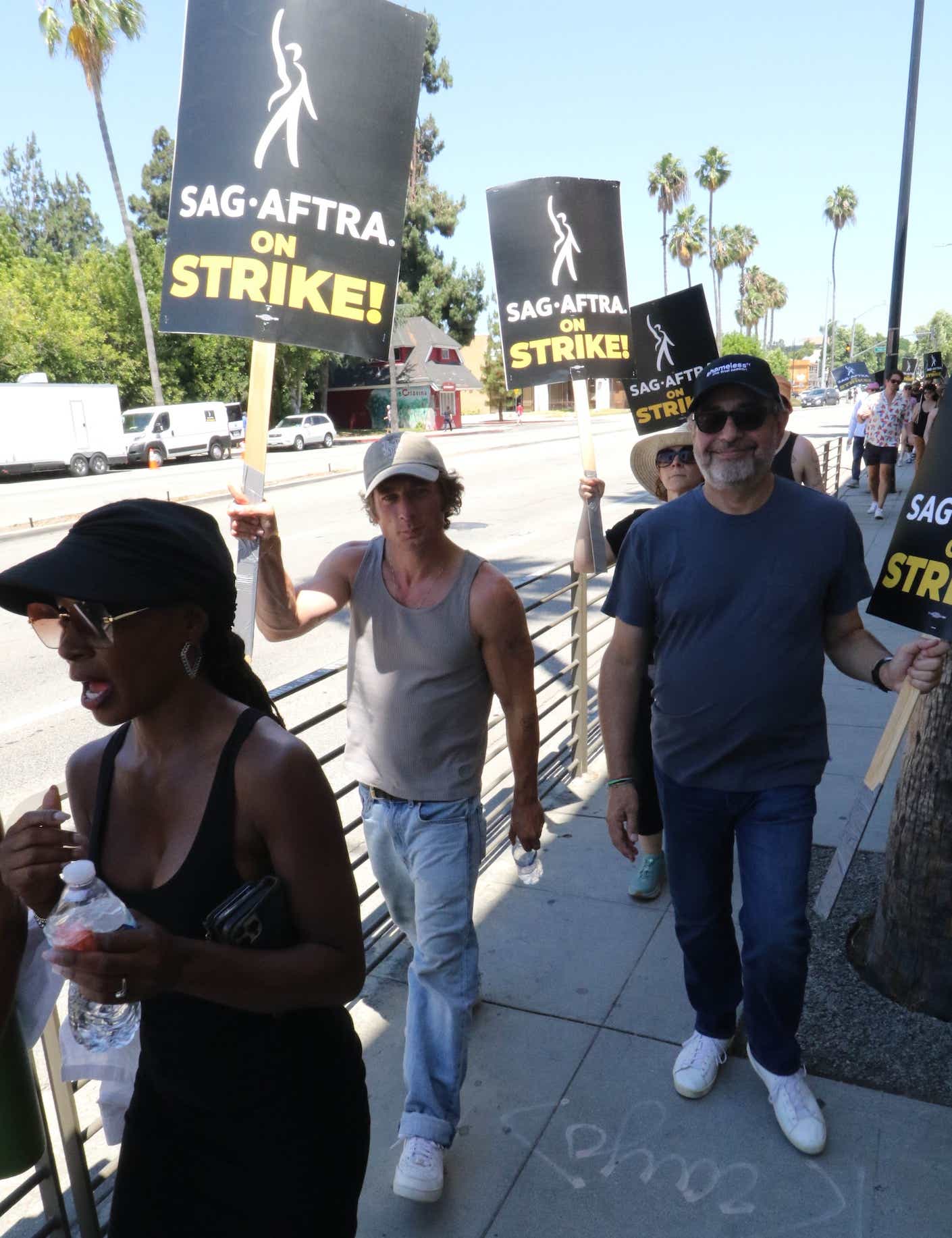
We've seen some icons on the picket lines. The Jeremy Allen White pic was obviously foundational. We saw Marcel the Shell with Shoes On — that was major. So good to see solidarity from the shell community. Who have been your favorite celebrities to see on the picket line so far?
It's very exciting to see anyone you recognize. Aubrey Plaza was out and about.
Hilary Duff was singing “What Dreams Are Made Of,” which was so exciting.
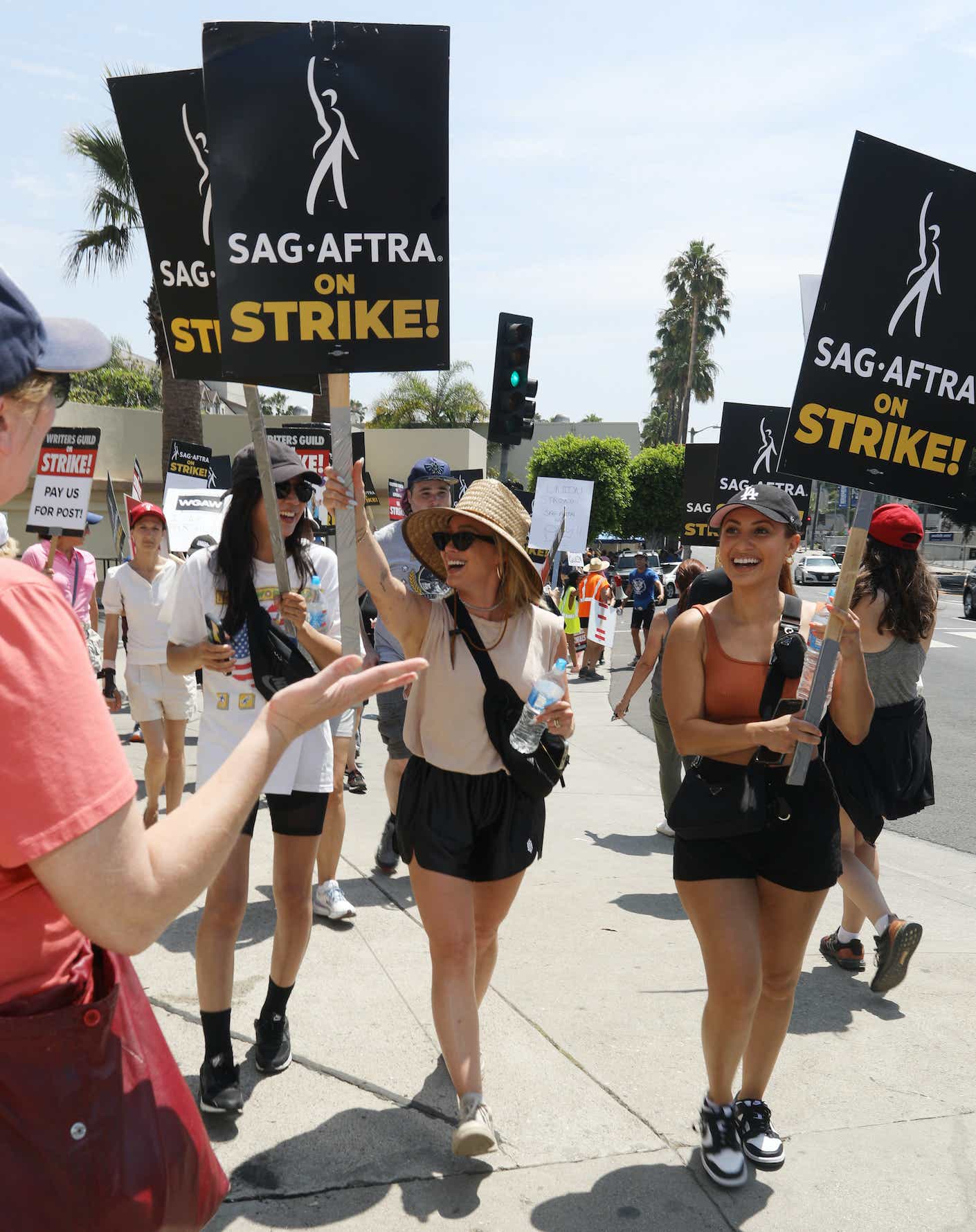
Brian Cox also hit the picket lines, which is huge.
And Lily Tomlin and Jane Fonda!
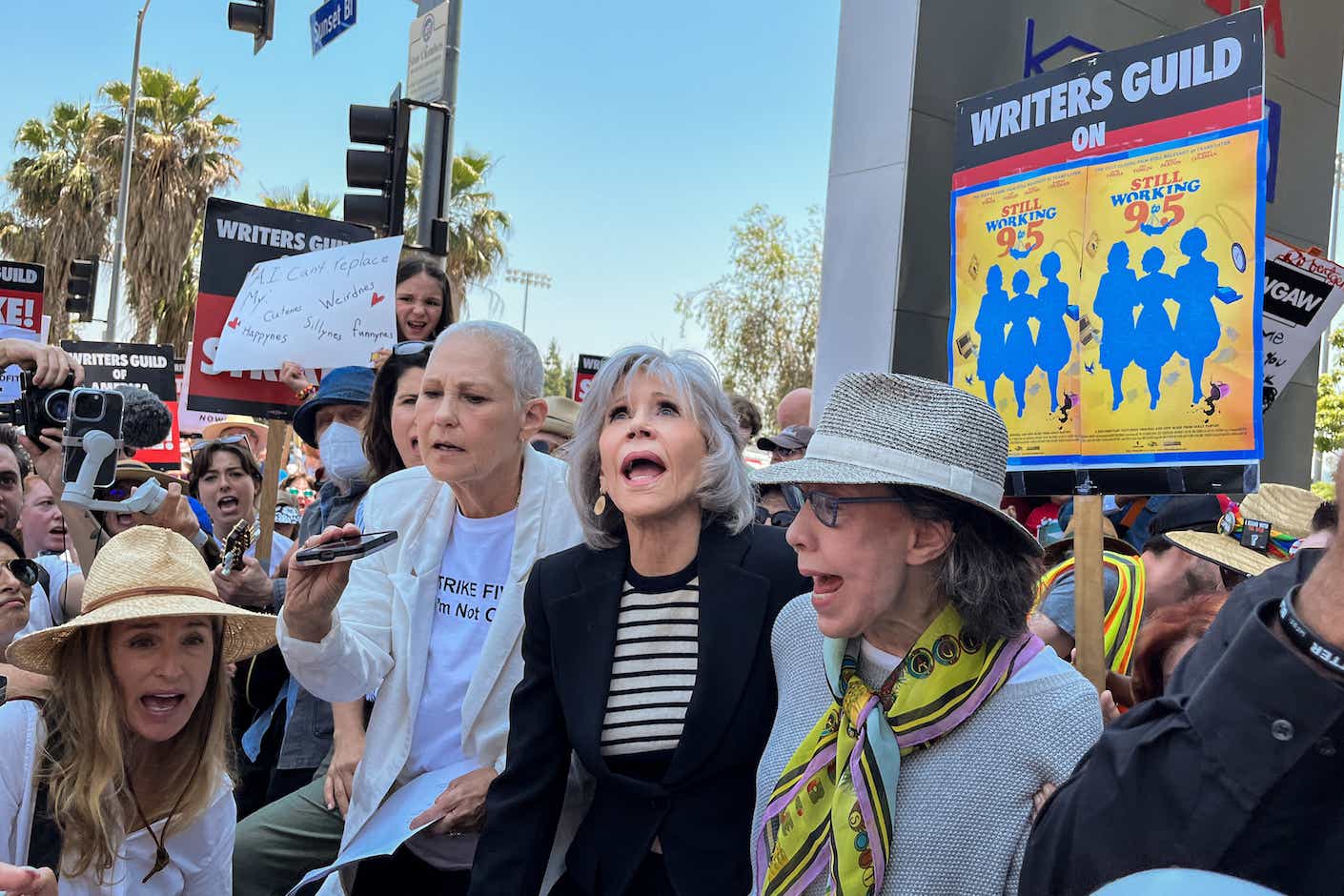
Major major major! The last thing I want to ask you about is the action items ahead. Obviously, the goal right now is to continue the conversation, both within Hollywood and among the general public. What is the next thing that you anticipate we might see? Is there an upcoming opportunity for SAG-AFTRA and AMPTP to sit down and renegotiate? What can we expect to happen next?
Every day has been a surprise, so I wouldn't even begin to predict. We told the AMPTP on our last day pre-strike, “We are ready and willing and able to negotiate as soon as possible,” and they said, “Okay, only if you don't go on strike and we talk like civilized people,” and we said, “Time is up, babe. You wasted this time, so we're going on strike.” So we're ready whenever; I don't know when they'll be ready, but we are the most creative people in the world and we're going to come up with ways to put the pressure on them. I would love for you to relay the message to the fans that these motherfuckers are blaming you guys and you can dig your line in the sand and say, “No, we're on the side of the creators, honey,” and we can continue to organize and build power in numbers that way.
There are rumblings about the strike ending before the end of the year, but is there any evidence to corroborate that?
I hope so! Honestly, you should ask the AMPTP 8 — Netflix, Amazon, Apple, Disney, Warner Bros Discovery, NBCUniversal, Sony, Paramount. These companies have said again and again they are losing far more money from the strikes than they would by just paying us fairly. These companies are choosing to prolong the strikes. These are the biggest, wealthiest media conglomerates in the world, and it is completely within their power to pay us fairly and end the strike today, yesterday, in May, July; to have never caused the strikes to happen in the first place. They deserve all the blame for this dragging on and all the pressure to stop it now.
This interview was originally published in Shut Up Evan.









